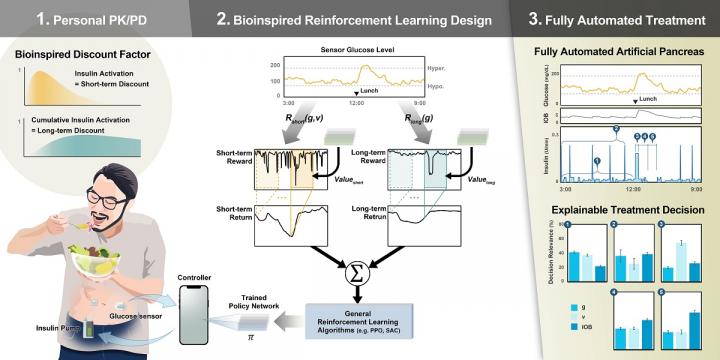
Credit: POSTECH
Diabetes is on the rise worldwide. It is a permanent condition that requires care over a life time. To help manage it, an artificial pancreas system, which automatically measures blood sugar levels to infuse the appropriate amount of insulin into the blood, has now become smarter thanks to AI learning.
A research team, led by Professor Sung-Min Park and Ph.D. candidate Seunghyun Lee and M.S. candidate Jiwon Kim of POSTECH’s Department of Convergence IT Engineering and Electrical Engineering, has newly developed a reinforcement learning (RL) based AI algorithm that calculates the amount of insulin needed for a diabetic patient and injects it automatically. These findings were published as a feature article in the latest issue of IEEE Journal of Biomedical and Health Informatics, an international journal on medical information science.
Patients with type 1 diabetes must inject insulin daily. One must check the amount of carbohydrates in the food ingested each time, calculate the proper amount of insulin, then inject the correct dosage before each meal. Though artificial pancreas systems on the market help with this process, there is still the hassle of having to input the meal intake in advance each time.
To eliminate this inconvenience, the research team added a pharmacological concept to reinforcement learning, widely known as the algorithm of AlphaGo. This method of AI algorithm achieved a mean glucose of 124.72 mg/dL and percentage time in the normal range of 89.56%. Even without inputting the meal intake, the policy showed performance comparable to that of conventional artificial pancreas.
“The fully automated artificial pancreas is like autonomous driving for the medical industry,” explained Professor Sung-Min Park. “The newly developed AI algorithm enables fully automated blood sugar control without the hassle of inputting meal or exercise information.” He added, “We expect this algorithm to be extended to other drug-based treatments.”
###
This study was conducted with the support from the Mid-career Researcher Program in Basic Research in Science and Engineering of the National Research Foundation of Korea.
Media Contact
Jinyoung Huh
[email protected]
Original Source
http://postech.
Related Journal Article
http://dx.




